The countries with the fastest internet in the world, on average, are:
- Singapore: 368.50 Mbps
- United Arab Emirates: 318.63 Mbps
- Hong Kong (SAR): 312.60 Mbps
- France: 308.01 Mbps
- Iceland: 306.22 Mbps
In 2025, the race to offer the fastest internet in the world is more competitive than ever. Countries are pushing to enhance their internet infrastructure, aiming to deliver top speeds and provide reliable public Wi-Fi connectivity. With the rise of remote work and digital collaboration, fast internet has become essential for productivity and seamless communication, making it a key priority for nations worldwide.
In this post, we’ll highlight the countries with the best Wi-Fi in the world, focusing on key criteria like average download and upload speeds and overall connectivity.
Average Internet Speed by Country
| Country | Download Speed in Mbps |
|---|---|
| Singapore | 368.50 |
| United Arab Emirates | 318.63 |
| Hong Kong | 312.60 |
| France | 308.01 |
| Iceland | 306.22 |
| United States | 291.18 |
| Chile | 263.32 |
| Denmark | 259.41 |
| Switzerland | 256.91 |
| China | 252.45 |
1. Singapore
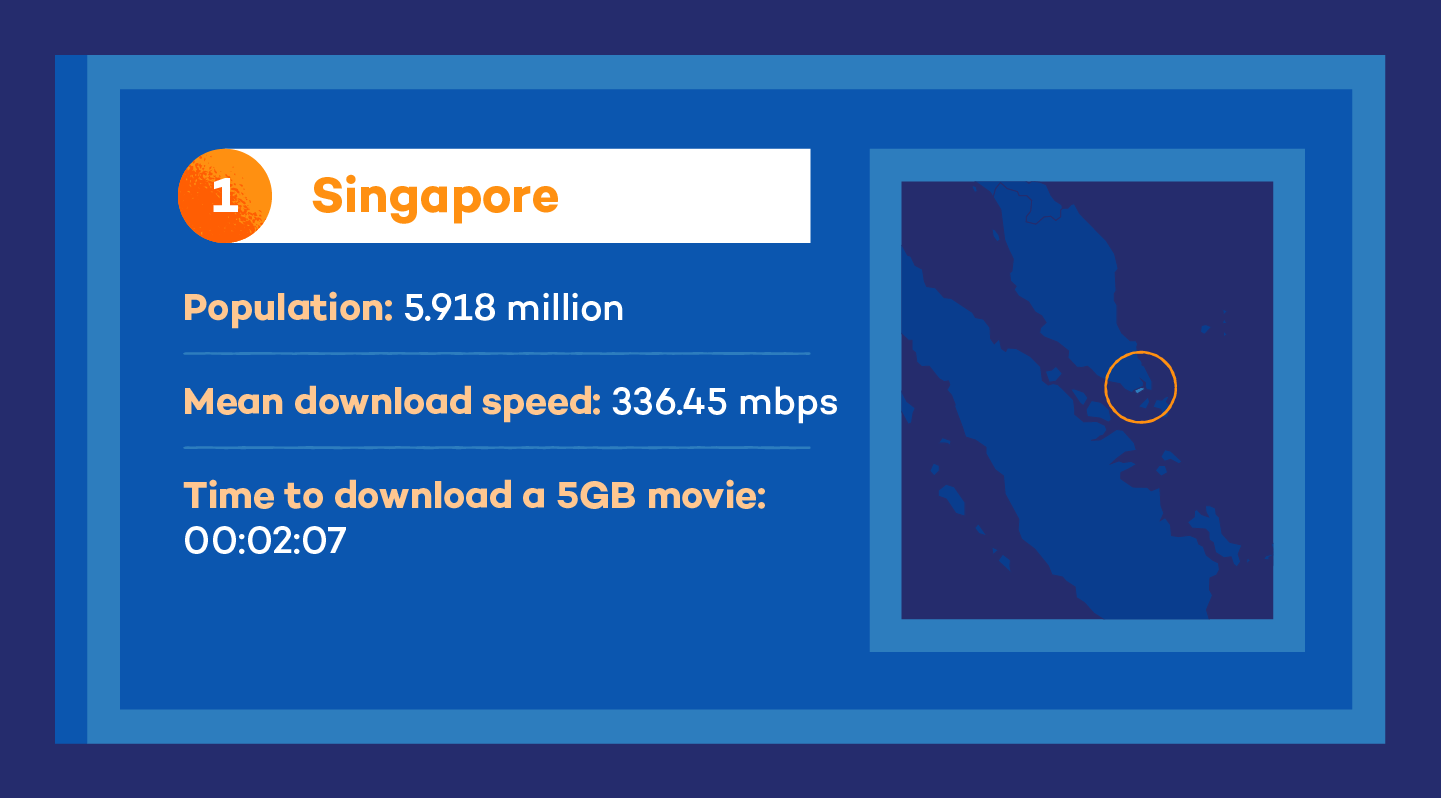
Singapore tops the chart in 2025, with an impressive average internet speed of 368.50 Mbps. Known for one of the fastest internet speeds in the world and its strong focus on technology and innovation, Singapore continues to deliver top-tier connectivity. Whether it’s for streaming, gaming or remote work, users in Singapore enjoy one of the fastest and most reliable internet experiences in the world.
2. United Arab Emirates
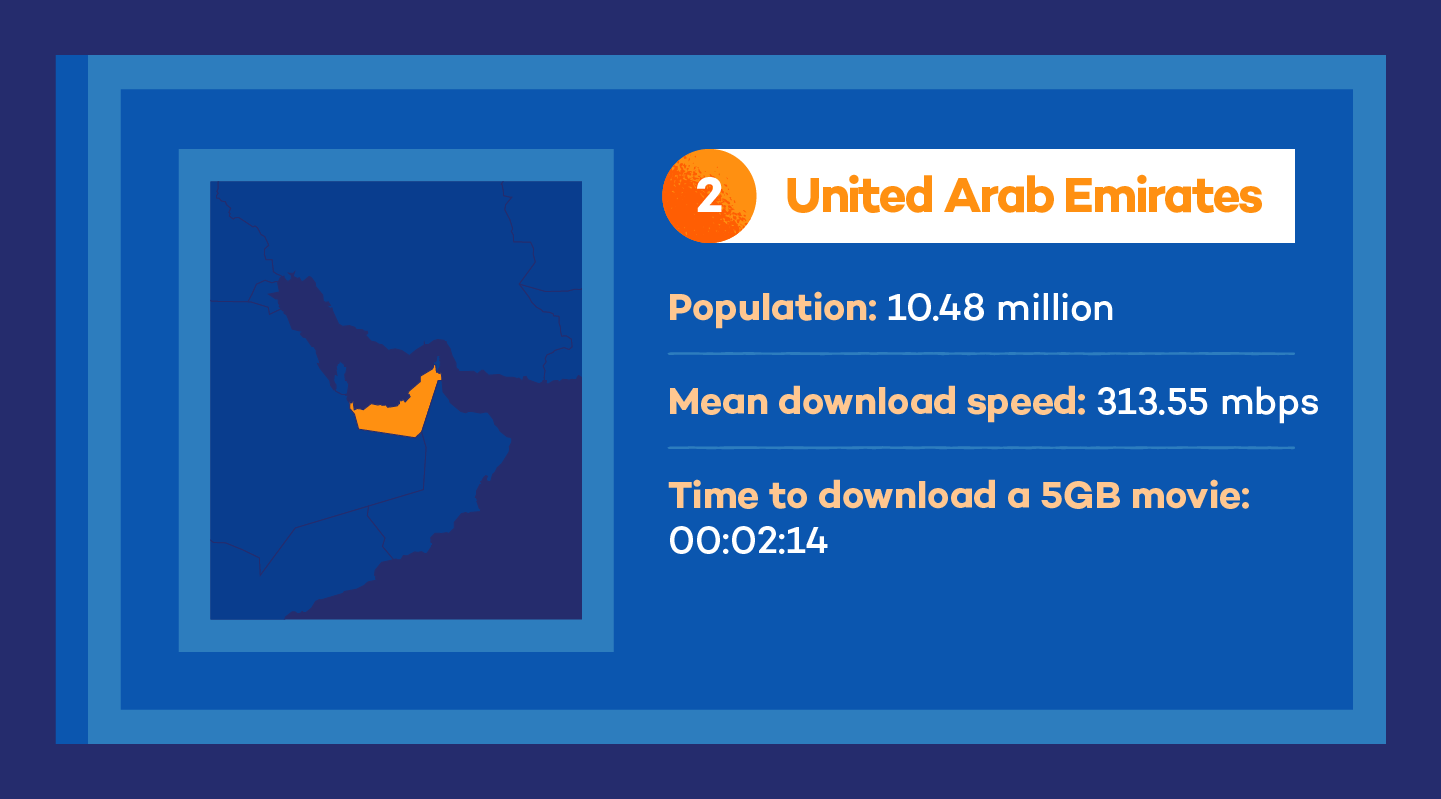
The UAE stands second when it comes to fastest Wi-Fi speed, with an average internet speed of 318.63 Mbps. With this kind of speed, people in the UAE are enjoying smoother streaming, quicker downloads and a better overall online experience.
3. Hong Kong
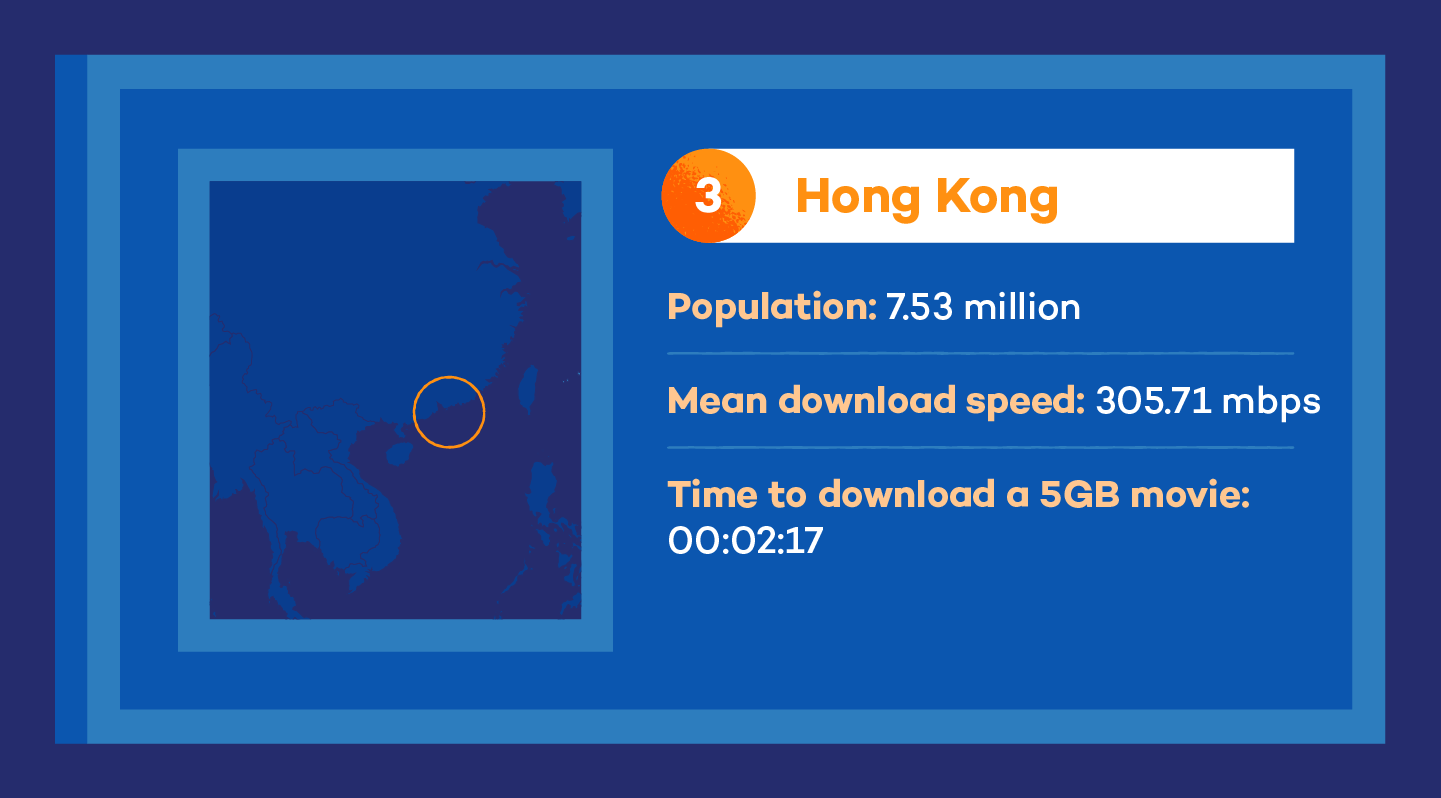
Hong Kong secures the third spot in 2025 with an average internet speed of 312.60 Mbps. This high-speed connectivity is a result of Hong Kong’s strong focus on maintaining advanced digital infrastructure. For residents, this means seamless streaming, fast downloads and a reliable online experience, making Hong Kong one of the best places for high-speed internet access.
4. France
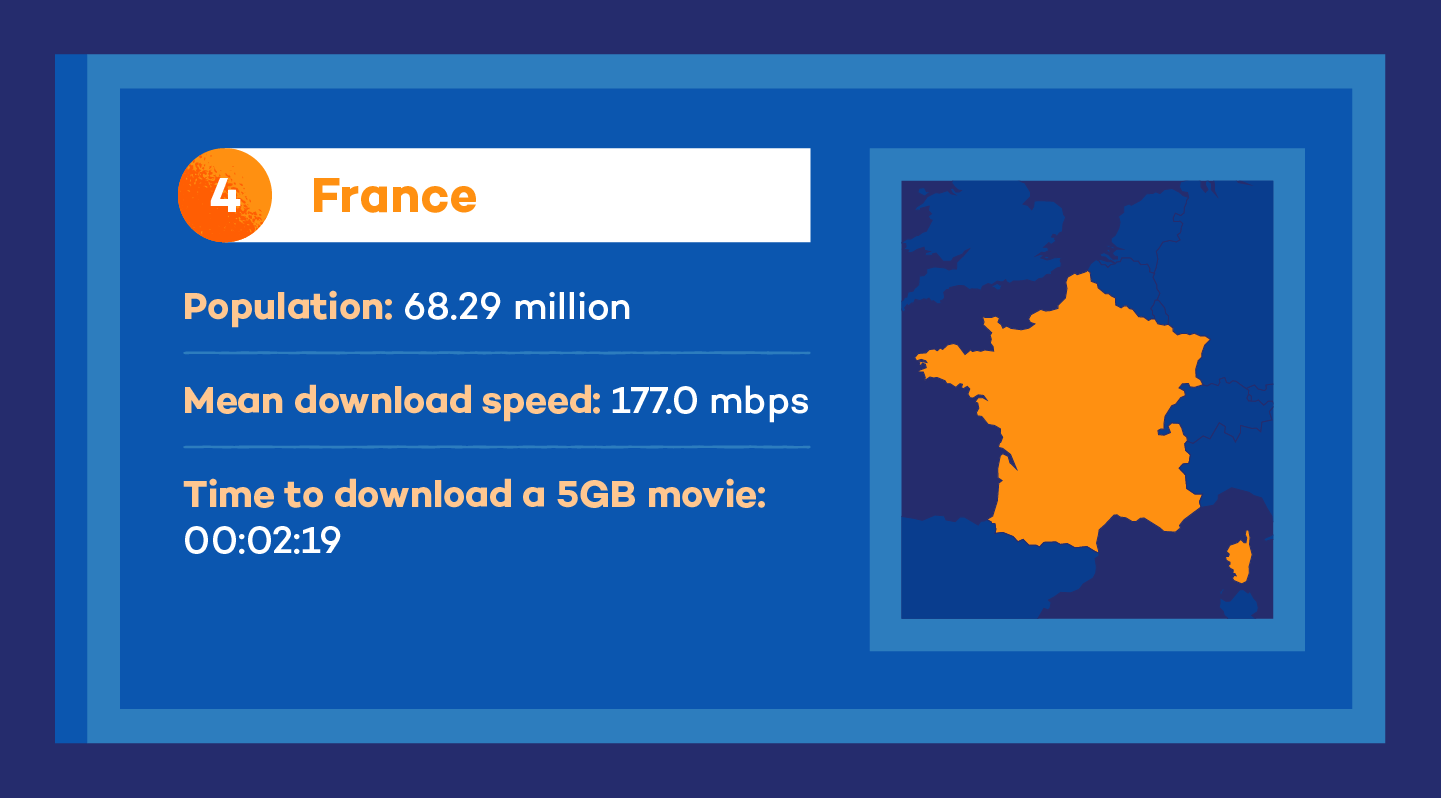
France ranks fourth globally with an average download speed of 308.01 Mbps. The country has made significant investments in fiber optic networks, expanding coverage across both urban and rural areas.
5. Iceland
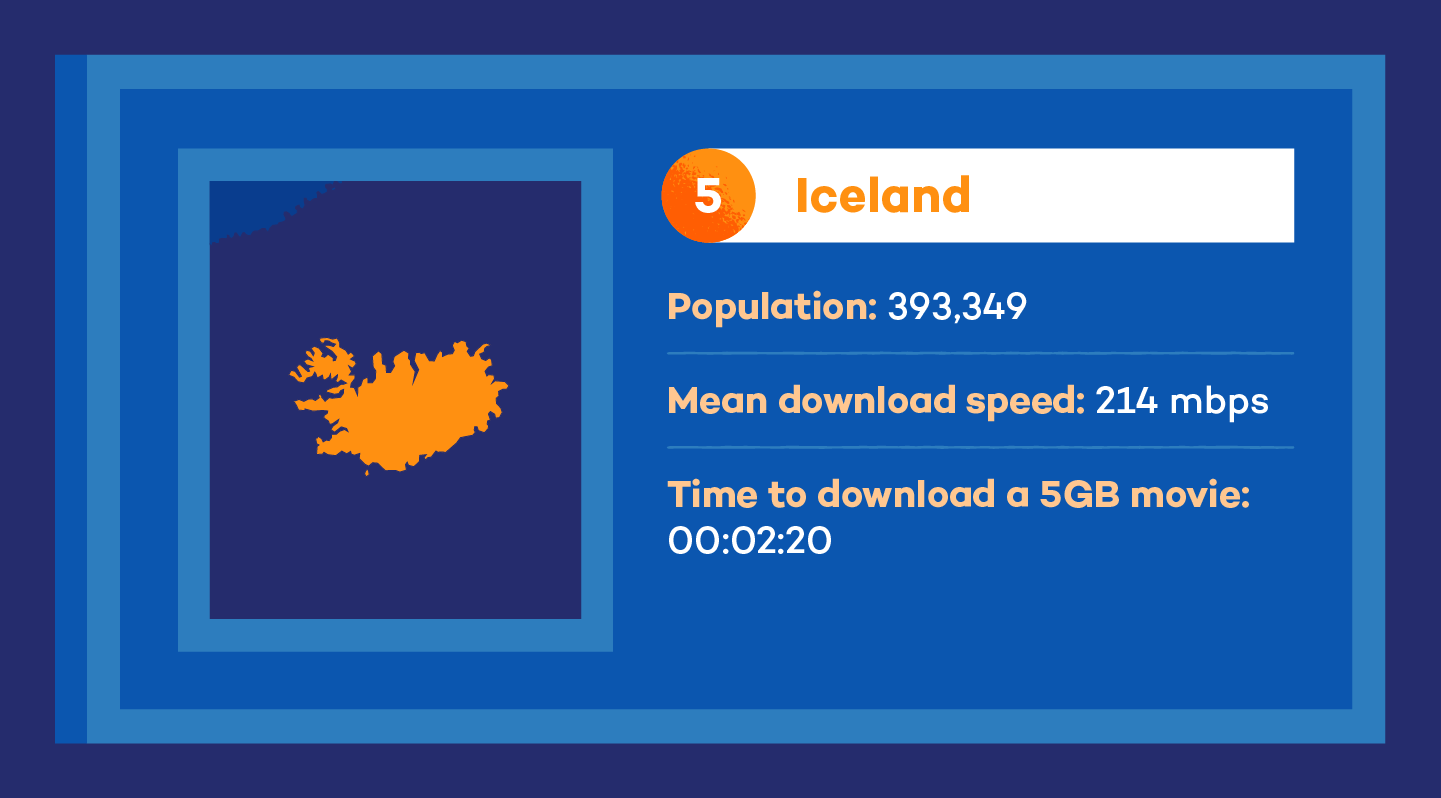
Despite its remote location, Iceland ranks fifth globally with an average download speed of 306.22 Mbps. This high-speed connectivity is attributed to several factors, including substantial investments in fiber optic infrastructure, a relatively small and technologically advanced population and a competitive market among internet service providers.
6. United States
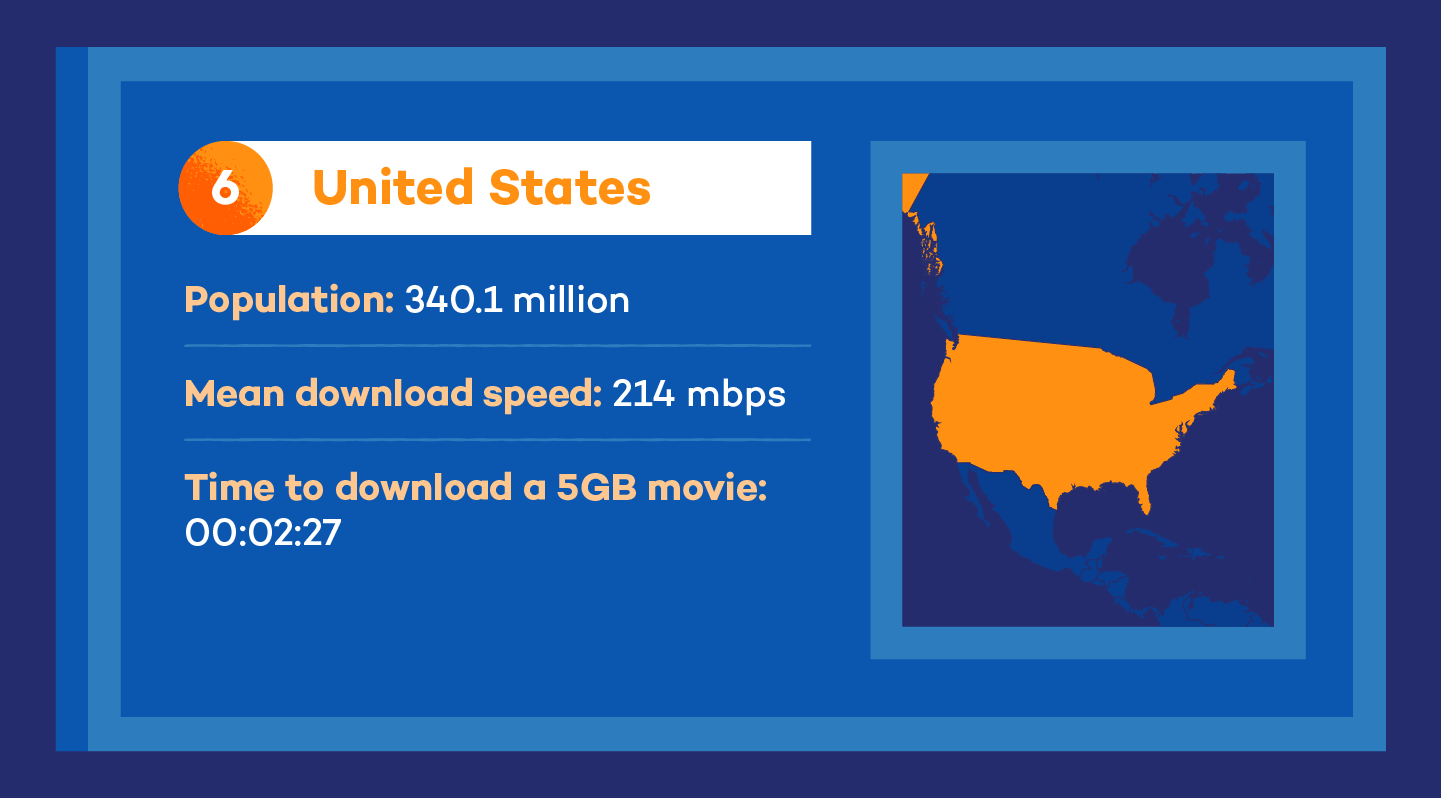
Despite being a technological powerhouse, the United States ranks only sixth in terms of average internet speed at 291.18 Mbps. This relatively lower position can be due to a combination of factors, including the country’s vast geographical expanse, diverse infrastructure landscapes and varying levels of competition among internet service providers in different regions.
While major cities and urban areas often enjoy high-speed connections, rural and less populated areas may experience slower speeds due to infrastructure limitations.
7. Chile
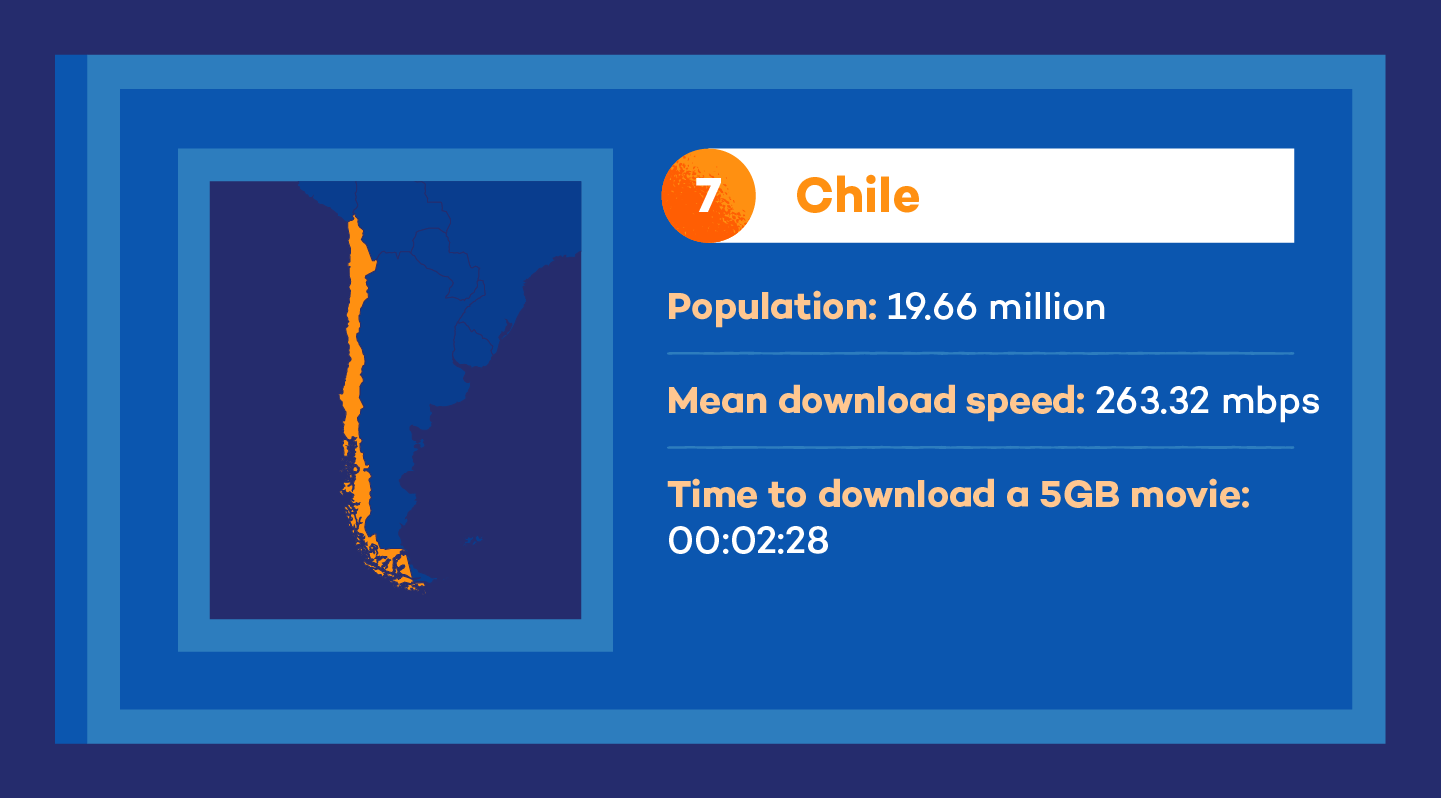
Chile ranks seventh with an average internet speed of 263.32 Mbps. With such high speeds, users in Chile enjoy faster browsing, smooth streaming and efficient online activities, making it the top country for high-speed internet in Latin America.
8. Denmark
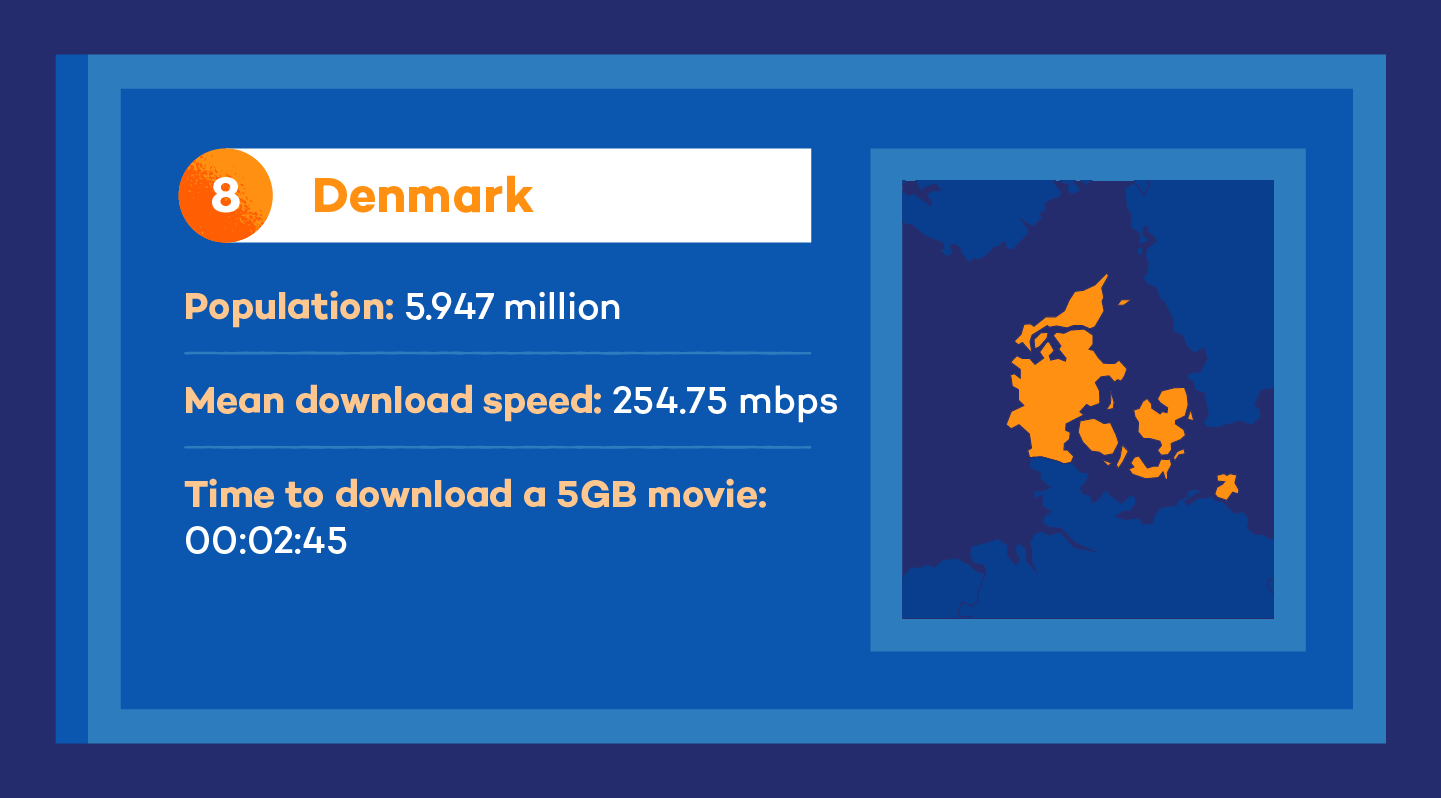
Denmark ranks eighth globally with an average download speed of 259.41 Mbps. Denmark’s robust internet infrastructure has played a crucial role in driving innovation, supporting remote work and education and enhancing the country’s digital competitiveness.
9. Switzerland
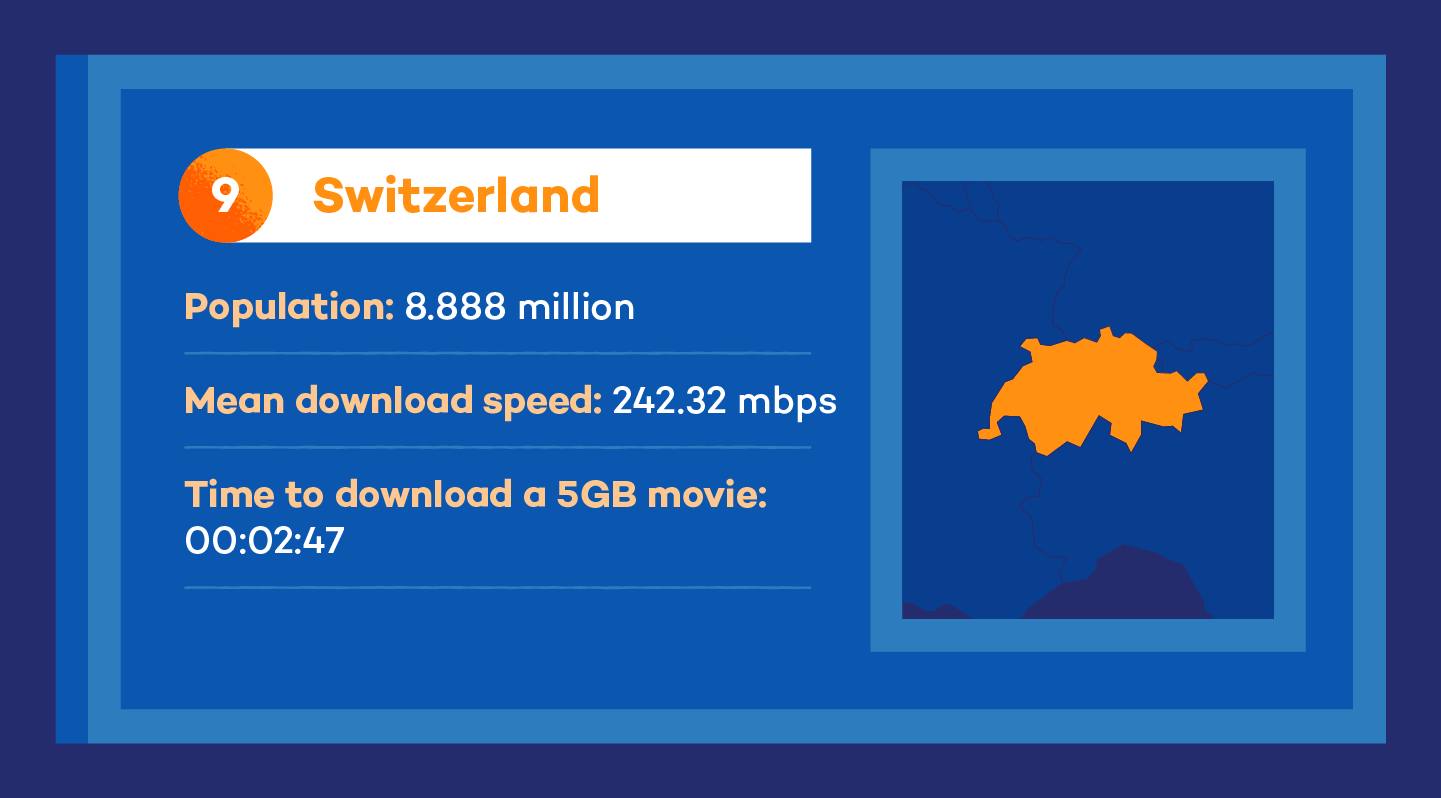
Switzerland ranks ninth in 2025 with an average internet speed of 256.91 Mbps. Known for its precision and efficiency, the country brings the same level of excellence to its digital infrastructure. Whether you’re working remotely from the Alps or streaming in the heart of Zurich, Swiss users benefit from fast, stable and high-quality internet that keeps them seamlessly connected.
10. China
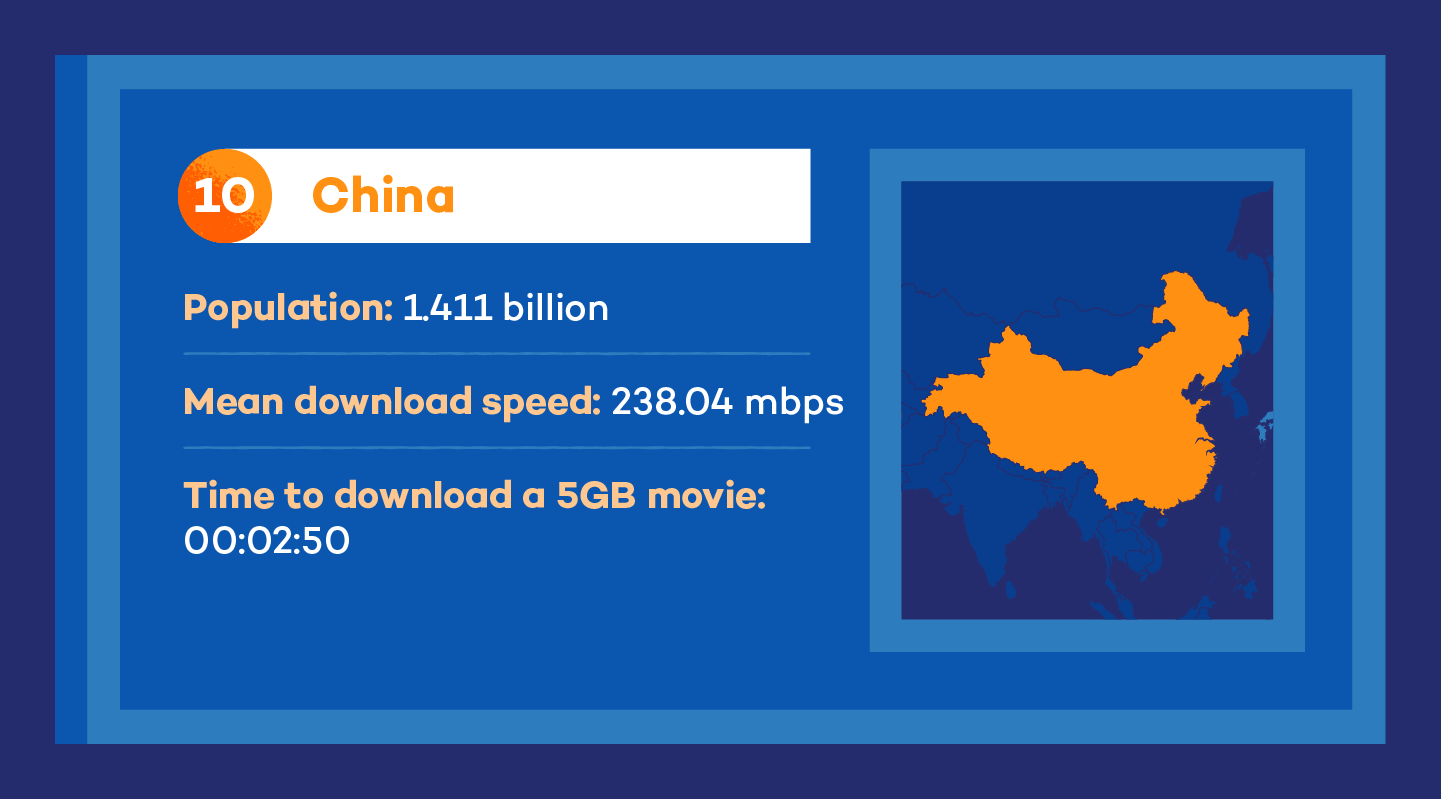
China comes in at 10th place with an average internet speed of 252.45 Mbps. Backed by massive investments in digital infrastructure and 5G rollout, the country continues to push the envelope on connectivity. From bustling cities like Shanghai and Beijing to smaller tech-driven hubs, users across China enjoy high-speed internet that supports everything from HD streaming to advanced cloud applications.
5 Things to Consider While Abroad
In addition to internet speed, there are other considerations when you’re planning on working abroad. These include surveillance, network access inequality, freedom of speech restrictions, social media restrictions and virtual private network (VPN) bans
Surveillance
This refers to countries that allow surveillance of browsing and online communications. Many governments have the ability to monitor your online activity. This is important to be aware of if you are working from a different country.
Network Access Inequality
This is the opposite of net neutrality, in which Internet service providers should allow access to all content and applications, regardless of the source. Network access inequality means these countries are able to favor or block products or websites. When you are working or visiting a different country, it is helpful to know if your search results are being skewed.
Freedom of Speech
Freedom of speech refers to the right to express your opinion without censorship, restraint or punishment. However, countries like China, Saudi Arabia and North Korea impose significant restrictions on this right, limiting what can be said or published, particularly in the media and online. For professions like journalism, understanding these varying laws is crucial when working internationally.
Social Media Restrictions
Many social media apps and sites are blocked in different countries. If you are an influencer or social media specialist that’s planning on traveling to a different country, knowing these restrictions will allow you to plan around them while working abroad.
VPN Bans
Virtual private networks or VPNs allow you to change your IP address and re-route traffic through a different countries’ network. If a country has any of the above restrictions, you may be able to get around them using a VPN. However, some governments have realized this and now ban VPNs.
There are many benefits of having fast Internet but it’s important to be sure you have the proper security while using it. Use a VPN while traveling abroad and download an antivirus to keep your computer or mobile device safe.
FAQ
Who Has the Fastest Internet in the World?
According to Speedtest.net, as of 2025, Singapore holds the title for the fastest fixed broadband internet in the world, boasting a median download speed of 368.50 Mbps.
Which Country Has the Slowest Internet?
According to Speedtest Global Index, Turkmenistan holds the record for the slowest internet in the world, with an average broadband speed of just 3.72 Mbps.






